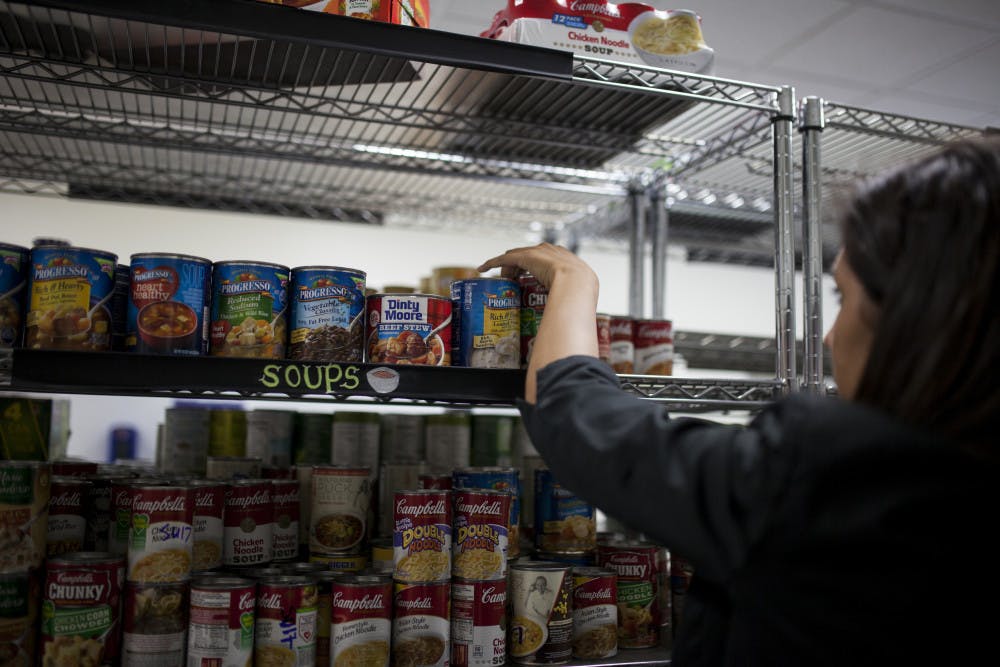To students facing financial hardship: you are not alone. Both UF and off-campus organizations have resources readily available to those who need them, said Sara Tanner, marketing and communications director for UF’s Student Affairs.
“We offer universal support to students and let them determine their level of need,” Tanner said.
This means these services are available to all students, regardless of their socioeconomic background. UF recognizes some students may be on the cusp of poverty and setting strict regulations may prevent them from getting the help they need, Tanner said.
“We don’t have a list of students that we specifically reach out to, but as we hear about students through U Matter, We Care and faculty members, we try to work with them individually,” Tanner said. “We work with students on a case-by-case basis based on individual needs, from food insecurity to housing insecurity.”
If any students are experiencing any of those struggles, Tanner urges them to reach out to U Matter, We Care, where a highly trained staff member will be able to direct them to the appropriate resources based on their needs, Tanner said.
One resource, the Field and Fork Pantry, allows students to take as much food as they need and visit the facility as much as they need to. Since it has opened, the pantry has given out 259,511 pounds of food, and since July 1, 2018, it has given out 90,907 pounds of food, Tanner said.
Field and Fork is open to all students and staff, and it has recently begun to expand to increase the resources at its disposal, Tanner said.
This expansion will include meat freezers, more space for fresh vegetables and a demonstration kitchen, Tanner said.
“The demo kitchen will help students learn how to use the food they receive to make healthy meals, which is especially important because of the health and wellness disparities often found at the poverty line,” Tanner said.
The expansion opens in November, but a temporary location can be found at 651 Newell Drive.
Another resource available on campus is the Molm Family Gator Career Closet, which allows students to borrow, or sometimes even keep, professional attire for job interviews, Tanner said.
The Career Closet opened in 2016 and can be found in the Career Connections Center in the Reitz Union.
For students who struggle with housing insecurity, off-campus scholarship houses provide opportunities to live cooperatively with other students, Tanner said.
“Each one is set up a little differently, and a few are very close to campus,” she said. “Students are able to live in these houses free of charge, but with certain chores or responsibilities, such as cooking a meal for the house a few times a week, for example.”
These houses are not officially affiliated with UF, and they are instead privately run by nonprofits, Tanner said.
Once such housing group, Southern Scholarship, is a rent-free housing scholarship for students who show academic success, financial need and good character, said Teresa Turner, director of student affairs for Southern Scholarship.
“Our mission is to help students who want to go to college to be able to go to college and hopefully graduate debt-free,” Turner said.
Founded in 1955 in Tallahassee, Southern Scholarship was created when students realized their initial scholarships did not include housing, so they went to their dean for help, Turner said.
“By the end of the year, we had our first house with 13 young men in it,” Turner said.
Southern Scholarship houses 178 students per year in Gainesville across nine houses. Throughout the state of Florida, they house around 458 students per year in 15 houses, Turner said.
Because this is a financial need-based program, to qualify for Southern Scholarship applicants must complete the FAFSA and their estimated family contribution should be $7,500 or below. Additionally, applicants must have a 3.0 cumulative GPA, and though it is not a requirement, they also look at organizations such as sports teams and bands which applicants are involved with, Turner said.
“Living here is a cooperative living experience, so residents do help in the cooking and cleaning, but they don't pay rent,” Turner said. “They save almost $13,000 a year in room and board expenses.”
Two days per week, residents clean the house together, and one night per week, they have to help either cook dinner or clean up from one meal, Turner said.
Residents do pay a food and service bill, but on average, this costs residents $970 per semester and includes their food, utilities, cable, laundry, internet, pest control and social activities, Turner said.
Woody Noel, a 21-year-old UF education sciences junior, said he likes both the opportunities Southern Scholarship has given him and its affordability compared to campus or apartment living.
Within the house, he notes the numerous opportunities which have helped him learn leadership skills which he is then able to mention on resumes and job interviews, Noel said.
“You're able to work with other people, and you make a lot of friends right away,” he said. “You don’t even have to be involved in a fraternity or sorority. You could just simply walk into the Scholarship Foundation, you’ll have a lot of friends.”
A volunteer stocking shelves with canned food at the Field and Fork Pantry on UF's campus in 2016.






